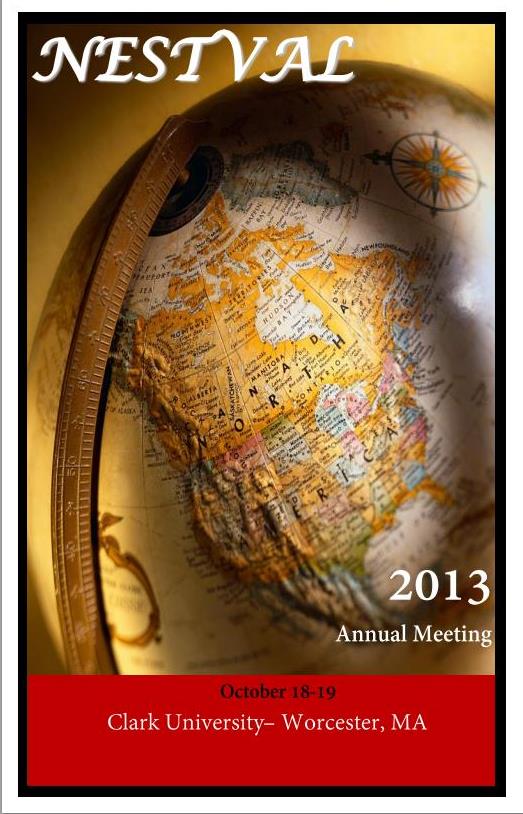 The New England-St. Lawrence Valley Geographical Society (NESTVAL) 2013 Conference will be held Friday and Saturday, October 18 to 19, at Clark University. Conference themes include “Climate Justice,” “Economic and Financial Crisis,” and “Reimagining Mid-Sized Cities,” and presentations on many topics are scheduled.
The New England-St. Lawrence Valley Geographical Society (NESTVAL) 2013 Conference will be held Friday and Saturday, October 18 to 19, at Clark University. Conference themes include “Climate Justice,” “Economic and Financial Crisis,” and “Reimagining Mid-Sized Cities,” and presentations on many topics are scheduled.
NESTVAL was established as the nation’s first regional professional geography organization. Beginning with the New England Geographical Conference at Clark University in 1922, this organization supports regional geographers and promotes geography education and research. NESTVAL is a regional division of the Association of American Geographers.
The 2013 NESTVAL Conference coordinators at Clark University are geography professors Jody Emel, Deborah Martin, and Dick Peet and graduate program administrator Brenda Nikas-Hay.
Highlights of conference events that are free and open to the public include:
- Explore the 20-foot, interactive EarthView globe from 10 a.m. to 3p.m. on Friday, Oct. 18, in Tilton Hall at the Higgins University Center. EarthView is an educational outreach project of the Department of Geography at Bridgewater State University. The EarthView is described as both a “fascinating teaching tool and a delicate work of art. The exterior is a hand-painted, large-scale map of the Earth’s surface, showing biological communities, rivers, seas, landforms, continents, islands, oceans, and major cities. The inside reveals the positions of tectonic plate boundaries and ocean spreading centers, along with all of the detail visible from the outside.”
- Plenary speaker Katharine Jacobs, professor at University of Arizona and Assistant Director for Climate Adaptation and Assessment, Energy and Environment Division, White House Office of Science and Technology Policy, will speak about “Climate Change, Climate Justice” at 11 a.m. Saturday, Oct. 19, in Tilton Hall at the Higgins University Center.
- Is it a crack in a fingernail or the landscape of a mighty river? The Macro or Micro? Art Exhibit will challenge your perceptions of art and science. An artists’ reception will begin at 6 p.m. at the second-floor gallery of the Traina Center for the Arts, 92 Downing Street. The exhibition features images by the artist/scientist team of Stephen S. Young, and Paul Kelly, both from Salem State University. From the website: “Dr. Stephen Young uses satellite imagery to study environmental change on Earth and his colleague, Dr. Paul Kelly, uses the electron microscope to explore the details of living organisms and Earth objects.”
Other conference happenings will include awards presentations at a banquet for conference participants on Friday evening, Oct. 18:
- A Teacher of the Year Award will be presented to AP Human Geography teacher Barry Stell, of South High School in Worcester. Stell is honored for his excellence in promoting geography education in the Worcester Public Schools system. The award is sponsored by Clark University, Clark’s Graduate School of Geography, and NESTVAL. Several Clark students assisted Stell with a pre-test program. They include: Arthur Elmes and Katherine Meng, Ph.D. students, and Clark graduates Yelena Finegold and Joey Danko, each now studying in Clark’s MA GIS program.
- National Geography Bee winner Sathwik Karnik will receive a special Student Award. Karnik is a student at the King Philip Regional Middle School in Norfolk, Mass. The award is sponsored by Clark’s Graduate School of Geography and the New England St. Lawrence Valley Geographical Society.
For more information, contact the Graduate School of Geography at Clark, 508-793-7337. Founded in 1887 in Worcester, Massachusetts, Clark University is a small, liberal arts-based research university addressing social and human imperatives on a global scale. Nationally renowned as a college that changes lives, Clark is emerging as a transformative force in higher education today. LEEP (Liberal Education and Effective Practice) is Clark’s pioneering model of education that combines a robust liberal arts curriculum with life-changing world and workplace experiences. Clark’s faculty and students work across boundaries to develop solutions to complex challenges in the natural sciences, psychology, geography, management, urban education, Holocaust and genocide studies, environmental studies, and international development and social change. The Clark educational experience embodies the University’s motto: Challenge convention. Change our world. www.clarku.edu
